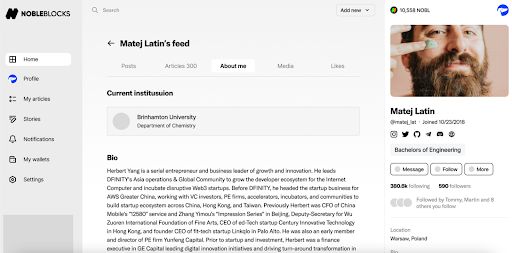
A DeSci Platform Tackles Inefficiencies of Scientific Publishing
The blockchain is poised to replace the traditional gatekeepers who financially benefit from the scientific community’s hard work and findings, leading to a more equitable distribution of resources and the decentralization of science.
Scientific journals, essential for spreading knowledge, are facing challenges such as article suitability, high fees and complex review processes. Despite digital evolution aimed at widening access, inefficiencies and access hurdles remain.
Drawing parallels from the disruptive transformations seen in music, media and finance, it’s clear that scientific publishing is ripe for an overhaul. Similar to the banking industry, which is built on a foundation of tradition and trust, there exists an undercurrent of frustration and dissatisfaction among its users—scientists.
While social media may make communicating snippets and interesting facts easier, the dissemination of deeper knowledge and findings is most often kept behind paywalls. Some of the highest-impact findings are typically published in the most prestigious journals, which charge exceptionally high fees to the researchers and their institutions for publishing them.
Article Processing Charges (APCs) for open-access journals exhibit a broad range, with averages around $500 for lower-tier journals, escalating to $2,500 for mid-tier journals and potentially surpassing $6,000 for top-tier publications, such as Nature Communications.
Free platforms like ArXiv or SciHub only partially address issues in scientific publishing. While these outlets help research ideas get published faster, they lack quality control and authentication mechanisms.
Therefore, the scientific publishing space needs to be modernized by learning from other fields that have successfully transitioned to more user-friendly models.
Blockchain emerges as a transformative force against the inefficiencies and inequalities of science publishing and communication. Through the decentralized science (DeSci) model, blockchain streamlines the publication process, enhances the clarity of peer reviews and fosters fairness.
Why the blockchain can promote rather than stifle innovation
Innovation and scientific breakthroughs occur globally, yet the recognition and publication of these ideas often originate from prestigious regions. This centralized approach may overlook radical ideas that challenge established norms, and scientists frequently face rejection during the peer review process.
A striking example of perseverance in the face of such challenges is the journey of Katalin Karikó and Drew Weissman. Despite facing rejection and skepticism for their research, which was initially dismissed by funding bodies and prestigious journals, they persisted. Their dedication laid the foundational research for mRNA-based COVID vaccines, a monumental contribution that ultimately led them to win the Nobel Prize.
Incremental scientific findings are a patent breeding ground
While incremental scientific findings can pave the way for broad innovations, their full potential and patentability may not be initially realized due to biases.
A prime example of this is that the CRISPR tool, initially published as a general mechanism, has become the “molecular scissors” that are transforming genetic engineering by allowing precise editing of DNA sequences.
How NobleBlocks plans to disrupt scientific publishing
A platform that reimagines the peer review process, NobleBlocks aims to mitigate biases by maintaining an immutable record of scientific discoveries. NobleBlocks utilizes a blockchain-based decentralized science (DeSci) model that establishes a public infrastructure for creating, reviewing, storing and distributing scientific knowledge fairly and equitably.
DeSci leverages blockchain technology to foster openness, incentivization and community engagement in scientific research and collaboration.
NobleBlocks streamlines scientific publishing by leveraging DeSci principles. It enables worldwide participation from all disciplines and across the academic spectrum.
NobleBlocks aims to transform scientific research publishing. Source: NobleBlocks.
NobleBlocks wants to enhance the existing peer-to-peer review system in scientific publishing. The platform’s primary focus is to establish a transparent and equitable review process. Scholars frequently engage in peer review without compensation, only to face subscription fees for accessing the research they’ve contributed to reviewing and producing. With the academic community already under pressure from funding challenges and the increasing demands on their time, NobleBlocks aims to address an urgent need for reform. This approach democratizes access to scientific knowledge and also ensures that every discovery is securely recorded and easily accessible, reducing publication costs and fostering innovation.
Eliminating Steep Processing Fees
NobleBlocks is designed to be cost-efficient for authors, eliminating steep processing fees and expensive access barriers that restrict the dissemination of knowledge. It also simplifies the publication process by offering a unified platform for authors, reviewers and editors to interact seamlessly, thus removing the bottlenecks that typically hinder the efficiency of scientific publication.
Furthermore, the platform can create immutable, chronological records of publications using blockchain technology. The model ensures that every discovery, finding or invention is preserved in a tamper-proof ledger, providing indisputable evidence of scientific contributions.
NobleBlocks is optimizing the overall user experience to make it easier to use. Source: NobleBlocks
NobleBlocks simplifies publishing, reducing timelines that often exceed six weeks with traditional methods. This efficiency is achieved through a token-based system that streamlines interactions between authors, reviewers and editors, ensuring a seamless and efficient path from manuscript submission to publication. NobleBlocks removes financial barriers for authors, and the system is designed to incentivize quality peer reviews, fostering a more efficient, transparent and accessible scientific publishing landscape.
Finally, upon manuscript acceptance, authors use tokens to cover the final steps of copyediting and publication, ensuring a seamless transition from submission to public dissemination. This approach not only reduces financial barriers but also incentivizes quality contributions throughout the peer review process.
Why the NOB token will circulate as scientific currency?
NobleBlocks introduces a token-based economy designed to empower researchers and academics. By leveraging the platform’s native token, NOBL, scientists will have the unprecedented ability to trade and exchange research hours directly, bypassing traditional financial barriers and expensive publishing fees.
The NobleBlocks platform plans to continue adopting a direct and instant reward system for community incentives. Through all these efforts, NobleBlocks aims to solidify its presence in academic publishing, build meaningful connections with its audience and promote the overall utility of the NOBL token.
The fact that the pre-sale phase of NobleBlocks’ native token NOBL was completed in less than five minutes also reveals the potential of the project.
Going forward, NobleBlocks aims to integrate artificial intelligence (AI) further to improve the efficiency and capabilities of the publishing process. This adoption signifies a commitment to leveraging cutting-edge technology to enhance scholarly communication and data privacy.
Portraying a future in which traditional gatekeepers of knowledge no longer shackle scientific research, DeSci redefines the nature of scientific discovery and dissemination. NobleBlocks invites researchers, scholars and innovators to explore the new era of scientific publishing and help shape a fairer, more accessible future for innovation.
The post A DeSci Platform Tackles Inefficiencies of Scientific Publishing appeared first on Cryptonews.

